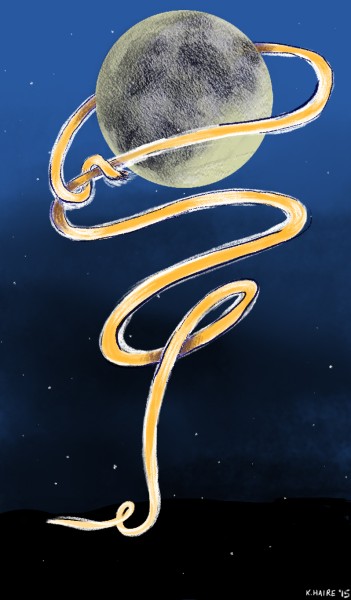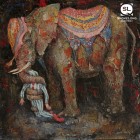At night, Thomas climbed up onto the roof of his house carrying a lasso. He threw it out, and it fell, limp and coiled. He tried again, and again, and on the seventh try, Goddamnit, he really did put that bastard right around the moon. He pulled it down and it wasn’t as big as they say, just the size of a beach ball. It was bright and spongy and tight like one of those high-bouncing balls for a quarter out of a vending machine. He thought if he dropped it high enough it would bounce all the way back to where it belonged.
When he went to bed, he kept the moon in his closet, and its glow pushed out under the door and around the seams.
That night, the ocean was calm without the tug of the moon. Serene, even. The fish that didn’t sleep, jumped up, broke the surface, and skated along the top. Whole schools danced on the water out where there was no light. In the morning, when the darkness left, and the birds flew out from the shore, and the waves worked up from the pull of the sun, the fish sunk back down into the cold depths of their homes.
Thomas woke up and took the moon out of his closet and went outside. He wanted to give it to Anne, the girl down the street with red hair who played violin and acted in the school plays. The girl he sat next to on the bus last year. The girl he slow danced with at the winter formal, who kissed him on the cheek and made his chest steal the staccato rhythm of Fourth of July firecrackers—the one who stopped sharing her lunch with him two weeks ago. She was moving and going to a new school in the fall and he knew he’d never see her again. He waited at the corner and looked at her house. A truck was parked out front and large men were carrying boxes. He walked over. One of the men looked down at him and squinted.
“That going in here?” he said.
Thomas shook his head. “Is Anne home?” he asked.
“Who?”
“The girl.”
“Oh. Upstairs.”
Thomas walked in the house. Square black stains where picture frames used to be marked the wall. The rooms seemed bigger. Cold. He thought of Anne alone in the empty house. Sitting surrounded by boxes. He could hear adults in the kitchen—the clink of dishes and the folding of paper. He walked up the steps. His shoes clopped against the bare wood and echoed. He could barely see over the moon, and it shone more brightly in the darkened corridor. Anne’s room was at the top, to the right. Her door was open. Her back faced the hall. She turned around and glowed in the moonlight.
“Who’s there?” she asked.
“Me, Thomas,” he said.
“I can’t see you. What’s that?”
Thomas lowered the moon to the floor.
“It’s the moon.”
“It’s beautiful,” she said, her face illuminated.
His heart flopped around his chest like fish on a glass ocean.
“I wanted you to have it,” he said and pushed it over to her.
“Why?” she whispered, not taking her eyes off the moon. She let it roll away, and it bounced off the wall and came back to a rest at the foot of her bed.
She looked at him, away from the moon and stood up. “Tom.” She shook her head. “I can’t.”
She dug into a box and pulled out a jar, black as the sea at night. Sparks like fireflies danced around inside.
“Weren’t the stars enough?” she said. She placed the jar on the bed.
Thomas felt thin, anxious—vibrating like the tightrope he’d tied to another universe. The one he’d walked to pluck the stars for Anne. Out where there was no oxygen. He couldn’t speak.
She reached again into the box and pulled out great wooden ships, a kingdom, waterfalls, monuments and cities of marble.
“I’m leaving, Tom. What am I going to do with all of this?” Her voice cracked. “And now the moon?”
“I…” Thomas choked.
“I never asked for any of this,” she said, her face red, eyes wet stone. “I never asked for the moon.”
“Anne.”
“Just go,” she said and looked away. “Take these things.”
Thomas packed up the box, as dutiful as a servant, and left the house. He tied a string around the moon and dragged it home. It seemed heavier, yet somehow less substantial. He felt sorry for it.
Later, from the same window he climbed out to steal the moon, he heard the truck drive away, its engine growing smaller. Gravity worked on his heart, tugging, pulling away as the tide. He looked out at the world he ripped barren for her.
That night he went down to the ocean and set loose the ships, destined to sail forever.
He unscrewed the lid to the sky and released the stars, where they shone in constellation.
He carried the monuments and cities on his back and placed them in the far off places he found them, in myths and song.
He let the waterfalls, in all their beauty, burst forth down over rock, overlooking fields where horses’ manes were free.
He climbed the highest mountain and dropped the moon from a cliff. When it landed, it bounced back up and kept going, over the oceans and cities, past the mountains and among the stars where it stayed, and where it hung, unflinching and bright. Farther than it was before. Just out of reach.

Notes from Guest Reader Ryan Bloom
“The Moon is a Wasteland” captures that black-magic moment when childhood fantasy and the corona of adolescence meet in an all-too familiar collision from which none of us truly recover. As in the best speculative fiction, the sense of wonder is inseparable from the coming grief.


